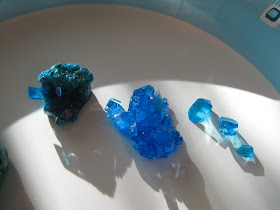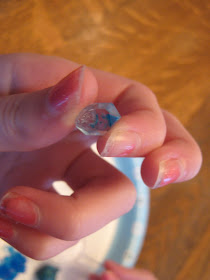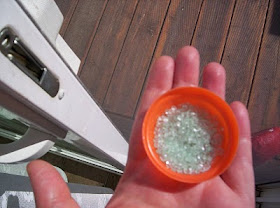
The children made me promise, some time ago, that I wouldn't buy educational presents for Christmas. So, I was happy to when a box arrived from my sister, with a couple of science kits included amongst all the toys, and candy.
Early in our homeschool adventure we used a lot of science kits, and enjoyed some of them. But, gradually we figured out we could perform most of the same experiments without the kits. So, I was curious to see how a kit would measure up now.
If nothing else, it provided a good chance to test the children's ability to read, and follow instructions. The instruction sheet, which has a colorful poster on the back...

...provides clear, step by step instructions, with accompanying pictures.

But, despite the apparent simplicity, there were several bumps along the way, leaving plenty of room for critical thinking, and stretching of scientific, and mathematical knowledge.
To begin with, even though the chemical pouches of blue, and yellow dyed monoammonium phosphate, came with scary warnings, suggesting the necessity of protective eye wear...

...the included safety glasses, where less than reassuring...

...although, G enjoyed modeling them.

The measurements for the water, that needed to be added, were given in millimeters, but the included measuring cup was marked with oz. and ccs (which after we Googled to double check turned out to be the same, for this purpose).
But, that was okay anyway, because although the instruction show the chemical being measured, and mixed with boiling water, in a mixing cup, there is an accompanying note, not to use the included measuring cup, as it is not heat resistant.
 Then, we were instructed to pour 2/3 of the chemical out of the packet...the non-see-through packet. Since approximate amounts are not really very scientific, and since the chemical was to be dissolved in a premeasured amount of water, G decided to make use of the "play" measuring cup, to determine how much chemical there was, and how much of it would make 2/3.
Then, we were instructed to pour 2/3 of the chemical out of the packet...the non-see-through packet. Since approximate amounts are not really very scientific, and since the chemical was to be dissolved in a premeasured amount of water, G decided to make use of the "play" measuring cup, to determine how much chemical there was, and how much of it would make 2/3.The kit came with three rocks for growing the crystals on, and two different sizes of plastic, growing cups, but stated the crystals would only grow in the smaller cups, even though one of rocks was much larger than the others, and didn't fit well in the smaller cup.
So basically, you cut the cups apart.

Boil the premeasured water.
Mix it with 2/3's of the contents from one of the pouches (the remaining one thirds get mixed together to make the third color)...

...until the crystals are dissolved. This was next to impossible. It took a LOT of stirring - more than most children would have the patience for. And finally, we just used it, mainly dissolved, and hoped for the best.

The solution is poured over one of the rocks, in one of the grow cups.

Seed crystals (which the instructions did not tell us to save out), are sprinkled over the rock, and the container is placed in a safe place, to allow the crystals to grow undisturbed, until the water evaporates down to the point of touching the growing crystals.

Then, the steps are repeated two more times, so three different colors of crystals are growing.
 The instructions suggest shining a flashlight through the water, to observe the crystals growing. We did begin to see crystals in our yellow solution within a few hours. But, we could not see through the blue, or green solutions, so we weren't sure if there were any crystals growing in them, until a few days later, when we poured off the water.
The instructions suggest shining a flashlight through the water, to observe the crystals growing. We did begin to see crystals in our yellow solution within a few hours. But, we could not see through the blue, or green solutions, so we weren't sure if there were any crystals growing in them, until a few days later, when we poured off the water.We didn't grow the spectacular crystal formations shown on the box, but we did have some success.



And, G enjoyed the process, as well as the results.

 I'm not sure I'd say the kit is worthy of the Smithsonian name, with toy safety glasses, and measuring cup, but it wasn't a total loss.
I'm not sure I'd say the kit is worthy of the Smithsonian name, with toy safety glasses, and measuring cup, but it wasn't a total loss.We've grown various crystals before, most recently from alum, with enough success, that I think a kit is probably not necessary for crystal growing either. But, it does come with an informative poster, and the glitz, and glamor, of at least some of the proper tools.
If your interested in growing crystals at home, without a kit, check out Wayne Schmidt's This and That, Crystal pages. They are very informative.
And, for more science themed fun in general, click over to this week's Science Sunday link-up, at Adventures in Mommydom.
It's great to be a homeschooler.

science is such FUN! it doesn't really count as those 'boring education presents'... "quasi-unschooling" is great!
ReplyDeletewhat a great present!
It's a shame it didn't live completely up to expectations. But, it does help me to remember to be wary of getting the kit just because it will be easier.......
ReplyDeleteWhat a wonderful and informative review. I am leery of kits at this point even though some of them look very tempting. I am thinking that most of simple science doesn't have to come out of the box, as your blog proves so very well.
ReplyDeleteBoth Papa and I couldn't help but laugh over the safety glasses and measuring cup. Go figure for a science kit huh!
ReplyDeleteI usually stay away from kits also, except when it comes to making circuits (I am VERY electronically challenged!).
ReplyDeleteOh, and tell G she sure can ROCK a pair of safety goggles! :0)
Austyn got the science kit that has a bunch of things in it including the crystals. We've not done that part yet. Thanks for sharing your review. I was a bit scared from all of the warnings and decide to put off the crystals a bit but reading about how it all worked I'm feeling a bit more relaxed. Thanks so much! :)
ReplyDeleteI was so glad to read this post, because my kids received the same kit for Christmas. Thanks for all the tips--it will help our experience go a little smoother!
ReplyDeleteHappy New Year!
I have found kits to be expensive for what you get in them. How crazy that the goggles are marked as being a toy and the measuring cup isn't adequately marked!!! At least you got some cool results!
ReplyDeleteWe have had similar experience with other brands of this type kit, and we did not get as good of crystals as you did. We haven't bought kits since then. Thanks for the reminder.
ReplyDeleteI like the results the kids got from the experiment too. I have brought tons of science kits. I will share with you that I never buy Smithsonian kits unless it is a digging kit. My favorite kits are by Thames&Kosmos they always live up to their expectations. Thank you for sharing.
ReplyDeleteYour crystals still look pretty good and like you said, it was probably good practice reading the instructions and having to do some critical thinking to make the process work. Little J received a magic crystal garden from one of his aunts, but we haven't done it yet. I'll have to remember to let you know how it turns out when we finish it.
ReplyDeleteLOL, I cannot believe the warning label on the glasses!
ReplyDeleteI have been tempted to buy science kits especially with those pretty covers but whenever I turn them around and read the instructions they seem to basic household items...so then I talk myself out of them.
As for buying educational gifts...I think my husband is going to be the more popular parent on birthdays and Christmas. I was thinking of all of the books and "educational" toys I could get her. My husband was the one going for the Barbies and electronic toys lol.
This is lovely for kids.
ReplyDelete